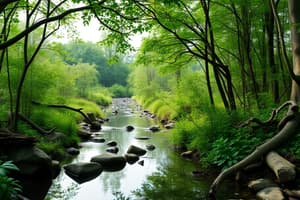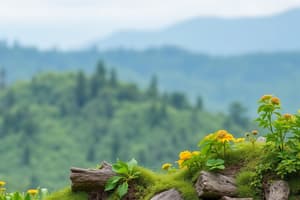Podcast
Questions and Answers
What does the term 'population' specifically refer to in ecology?
What does the term 'population' specifically refer to in ecology?
- Individuals of one species interacting in a specific area (correct)
- A variety of species coexisting
- All living organisms in an area
- The abiotic factors in a specific habitat
Which of the following best describes an ecosystem?
Which of the following best describes an ecosystem?
- An area solely based on climate conditions
- The interaction of biotic and abiotic factors in a specific area (correct)
- Only the living organisms in an environment
- A collection of various communities living together
What are abiotic factors?
What are abiotic factors?
- Nonliving components like temperature and sunlight (correct)
- The interactions between living organisms
- The energy flow in an ecosystem
- All living things in an ecosystem
Which of the following correctly defines a niche?
Which of the following correctly defines a niche?
Which of the following factors is considered density-dependent?
Which of the following factors is considered density-dependent?
What is the global ecosystem known as?
What is the global ecosystem known as?
Which of the following best describes a community in ecological terms?
Which of the following best describes a community in ecological terms?
What distinguishes abiotic factors from biotic factors in an ecosystem?
What distinguishes abiotic factors from biotic factors in an ecosystem?
Which of the following is considered a density-independent factor influencing population dynamics?
Which of the following is considered a density-independent factor influencing population dynamics?
Which statement best describes a niche in ecological terms?
Which statement best describes a niche in ecological terms?
What role does latitude play in determining ecological characteristics?
What role does latitude play in determining ecological characteristics?
Which of the following statements about the biosphere is accurate?
Which of the following statements about the biosphere is accurate?
Flashcards
Ecology
Ecology
The study of how organisms interact with each other and their environment.
Population
Population
A group of individuals of the same species living together in one area, capable of interbreeding.
Community
Community
All living organisms living in a specific area.
Ecosystem
Ecosystem
Signup and view all the flashcards
Abiotic Factors
Abiotic Factors
Signup and view all the flashcards
Niche
Niche
Signup and view all the flashcards
Study Notes
Ecology
- Ecology is the study of how organisms interact with their environment and each other.
Population
- A population is a group of the same species living in a specific area at a given time, who can interbreed and interact.
Community
- A community encompasses all the organisms in a given area.
Ecosystem
- An ecosystem includes all organisms and the non-living (abiotic) factors in a particular area.
Abiotic Factors
- Abiotic factors are non-living aspects of the environment. Examples include temperature, water, sunlight, wind, rocks, and soil.
Biotic Factors
- Biotic factors are living components of an ecosystem, and include interactions like predator-prey relationships, parasite-host relationships, and other organism-organism interactions. Examples are birds, insects, predators, prey, and parasites.
Biosphere
- The biosphere is the global ecosystem.
Niche
- An organism's niche includes its feeding habits and the conditions it needs to survive.
Latitude and Altitudes
- Latitude describes horizontal position on the Earth, with the equator as the lowest latitude and the poles as the highest.
- Altitude describes vertical position and the range of elevation.
Density-Dependent Factors
- Density-dependent factors influence populations based on their size. Examples include predation, famine, diseases, and toxic waste.
Density-Independent Factors
- Density-independent factors affect a population regardless of its size. Examples include volcanoes, forest fires, floods, and earthquakes.
Studying That Suits You
Use AI to generate personalized quizzes and flashcards to suit your learning preferences.




